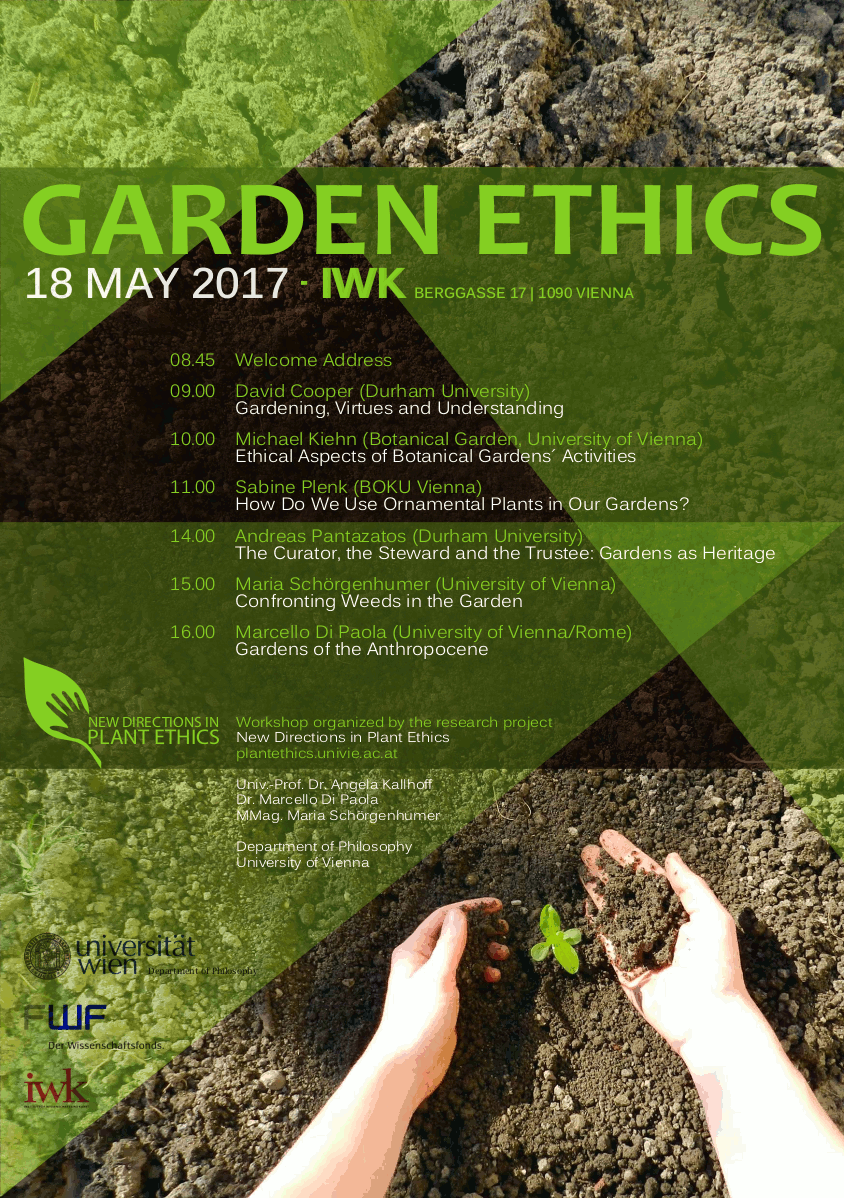Workshop am 18. Mai 2017
Garden Ethics
8:45-17:00 Uhr, IWF, Berggasse 17, 1090 Wien
Der Garten als wunsch- wie auch konfliktgeladener Raum des Zusammenwirkens von Mensch und Natur steht im Zentrum dieses interdisziplinären Workshops zwischen Philosophie, Botanik, Gartenbau und Grünraumgestaltung. Sowohl der Garten wie auch die Praxis des Gärtnerns wird dabei zum Gegenstand ethischer Überlegungen gemacht und das Verhältnis zwischen Mensch und Natur kritisch bestimmt. Wie können wir unser Verhältnis zur Natur im Garten bzw. mit Gärten gestalten? Von welchen Werten ist es geprägt? Wie sollen wir uns in Bezug auf die Umwelt und in Auseinandersetzung mit der Natur verhalten? Wie können wir am besten in die Natur eingreifen, mit ihr arbeiten und leben? Welche Konflikte sind dabei zu bewältigen, welche Tugenden können dabei helfen? Inwiefern eröffnet der Garten vielleicht Wege eines pfleglichen Umgangs mit der Natur?
Programm:
08:45
Openings
09:00
David Cooper
Gardening, Virtues and Understanding
This talk recalls discussions, in several ancient traditions, of the contribution of gardening to the good life. Its focus is on kitchen gardening – ‘growing your own’ – but the discussion extends to other forms of gardening. It is argued that ‘planetary’ or ‘global’ reasons for growing your own are unpersuasive, and attention then turns to ‘personal’ reasons of a broadly moral kind. A central claim is that certain virtues and forms of understanding – themselves inseparably related – are integral to good gardening. It is for this reason that gardening both testifies to and contributes to the good life of a human being. A final section discusses the bearing of recent developments in ‘plant ethics’ on the approach taken in the talk.
10:00
Michael Kiehn
Ethical Aspects of Botanical Gardens’ Activities
Botanical gardens devoted to research, conservation and education are involved in a number of procedures and decisions which do not (only) relate to scientific data, but require ethically based considerations. Such topics include, i.a., the evaluation of “legal access and fair and equitable sharing of elements of biodiversity” according to the regulations of the Convention on Biological Diversity, “best practices” for sustainability, the “alien species“ issue, or questions about what to conserve in a botanical garden or which partners and sponsors to choose. The presentation will look at challenges, discussions and decision making processes connected with such topics in botanical gardens.
11:00
Sabine Plenk
How Do We Use Ornamental Plants in Our Gardens?
Once upon a time, gardens were areas protected against the unexplored wilderness. Inside the garden order prevailed and planting design was governed by strict aesthetic rules. Today, the ornamental garden is more commonly suggestive of being wild and naturalistic, embracing native species and ecologically dynamics. Vegetation ecology now influences designed plant communities. As a result, there is less effort and fewer costs in establishing and managing plantings – which promotes sustainable concepts in public urban space. To appreciate the wild aesthetic, however, people need to change the way they perceive plants and gardens.
Human interaction with plants and the environment as seen through historical and ecological aspects and from a social perspective makes a planting designers' contribution to “Garden Ethics”.
14:00
Andreas Pantazatos
The Curator, the Steward and the Trustee: Gardens as Heritage
In this essay, I propose that one of the chief values that demands attention for our engagement with gardens is their heritage value. Broadly construed, this value is anchored in the fact that gardens have been inherited from the past and their significance as gardens in the past and present should be transmitted to the future. I argue that we can distinguish three different approaches to our engagement with gardens as heritage: the curator, the steward, and the trustee approaches. The curator approach is concerned with the care of the ‘ephemera’ of the garden. The steward approach focuses more on taking care of the garden for future generations. It is concerned with making the minimum intervention to gardens so as they are delivered to the next generations as intact as possible. Given that the trustee approach is concerned with the transit of the significance of what is inherited from the past to the future in a secure way, then this approach can account better for the role that decay and decline play in defining the significance of gardens as heritage that the curator and steward approaches seem to overlook. One of the advantages of the trustee approach is that it considers the history of the garden as a biographical story, paying attention to its many constituent episodes.
15:00
Maria Schörgenhumer
Confronting Weeds in the Garden
For once, let’s shed light on the dark side of the garden and think about weeds – the negated, rejected, unwanted plants people strive to eliminate. – Why? How come? What makes a plant a weed? How, by inferring which values, do we relate to and deal with nature in the garden, especially with its unwanted parts – and how should we?
These questions are pursued by exploring the role of weeds and different ways of confronting them in the garden, ranging from radical weed killing to approaches of revaluating weeds ecologically, aesthetically, ethically. What if, in the end, weeds can’t be erased from the garden in any way, but rather point out a deep ambivalence of our entanglement with nature – an inconvenient truth?
16:00
Marcello Di Paola
Gardens of the Anthropocene
This paper provides reflections on the role of gardens in our thinking about our environments, and on the role of urban gardening in our acting in and for our environments. It refers these issues to a broader exploration of the ethical and political station of individuals in the Anthropocene – this new epoch in which the Earth is being remade by human activity. Arguments are provided supporting the thesis that urban gardening is a culturally disruptive, morally required, ethically uplifting and politically incisive practice, which individuals and groups should pursue in the Anthropocene.
Auf jeden Vortrag (30 min) folgt eine Diskussion (15-20 min).

